
What are "vocab in context questions" and what are the best ways to approach answering them? In this article, I'll go over the basics of what vocab in context questions are, then transition into more in-depth discussions of each of the two types (complete with examples, both official and homemade).
Finally, I'll end with suggesting strategies to use when tackling these types of questions.
feature image credit: Sopa de letras by srgpicker, used under CC BY 2.0/Cropped from original.
Note: This article is about the Vocabulary in Context questions on the old, out-of-2400 SAT, which had five answer choices (instead of four) and were worded slightly differently. If you're looking for advice on these kinds of questions for the new SAT Reading and Writing and Language sections, we recommend reading our article on Words in Context questions instead!
What Are Vocab In Context Questions?
Vocabulary in context questions are the questions on SAT Reading passages that question you directly about vocabulary in the context of a paragraph. While having vocab knowledge can help you with other types of questions, for the purposes of this article, I've focused on the types of questions where knowing vocabulary is essential to being able to get the right answer.
(Note: This article is not about sentence completion questions, which are no longer part of SAT Reading with the new 2016 SAT.)
From my reviewing of official SAT practice tests, I've come to the conclusion that there are two types of ways the SAT Reading passages will question you on vocabulary:
#1: Based on how the word is used in the passage, what does that word mean?
#2: How would you sum up the meaning of a few lines or a paragraph, using one word as your answer?
Read on for a more detailed look at each of these types of vocab in context questions.
Question Type 1: What's The Meaning Of The Word In Context?
These questions are probably among the most straightforward of all the SAT Reading questions. I like to think of them as asking "Here's the word—what's the definition?" Of course, just because the questions are straightforward doesn't mean that they can't be tricky, but the way the questions are phrased themselves are pretty simple. In fact, they are almost always asked in one of the following ways:
- As used in line 42, "stake" most nearly means…
- In the context of line 42, the phrase "dark husband to the midnight" means…
(I've altered the actual words asked by official SAT questions here, but you get the picture).
Why does the SAT use the phrase "most nearly," rather than always just straight up asking "what does this word mean?" I believe there are two reasons:
#1: The phrase is designed to trick you into picking an answer that kind of works (after all, stake only has to nearly mean the answer choice, right?
#2: It's the SAT's way of covering its butt (nope, you can't just pick an answer that works, you have to pick the best answer out of the available choices).
Most often, these "Here's the word, what's the definition?" questions are about words that have multiple meanings. Since the SAT wants to trick you into rushing into thinking you know the answer, the test often will include an answer choice that is accurate for some definition of the word, just not the way it's used in the passage. Here's an example, taken verbatim from an official SAT practice test.
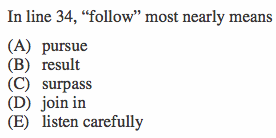
Just going off the top of my head, the word "follow" can probably be used to mean any of the answers, depending on context. In order to figure out what it means in line 34, you're going to have to go back to the passage. The source sentence for this question reads as follows:
"I came to realize that if I were able to record part of the dance—that is, the spoken part—and reenact it, the rest of the body would follow." (lines 31-34; underline mine)
How would you solve this question? First, replace the word with your own definition so that you have a preconception of what you're looking for: "I realized that if I could record the spoken part of the dance and reenact it, the rest of my body would be able to do it, too." As you can see, the rephrasing does not have to be super elegant, just accurate.
Next, substitute answers into your rephrased sentence. The answer should look something like what you rephrased in the first step. For this question, only "join in" works ("I realized that if I could record the spoken part of the dance and reenact it, the rest of my body would join in").
Want to see another example? No problem! Here's a trickier example I've based on an actual SAT question (although I took some liberties with the topic).
Example A:
"The relationship of the vampire and his assistant seemed to have been reversed, and Igor, now in his early twenties, was the authoritative one; since boyhood he had been taking on one responsibility after another, until he had left the vampire with nothing to perplex him but how to while away the hours when the servants were busy and Igor was out searching for brains."
In this sentence, "perplex" most nearly means…
(A) trouble
(B) bewilder
(C) astonish
(D) entangle
(E) embarrass
If you replaced the word "perplex" with any of the answer choices, with any of the answer choices, it would make thematic sense. After all, since Igor's taking over all the responsibilities there it's possible there could be nothing to bewilder, astonish, entangle, or embarrass the vampire. In addition, doesn't "perplex" sometimes have something to do with bewilder or astonish?
Danger! Danger! This is all part of the SAT's Cunning Plan™ (not actually trademarked) to trap you!
 It's a trap by Mike Knell, used under CC BY-SA 2.0/Cropped from original.
It's a trap by Mike Knell, used under CC BY-SA 2.0/Cropped from original.
Do not answer the question based on things that "could be right," depending on information you do not know.
Imagine you're a cranky English teacher, grading student interpretations of a book read for class. You're not a generous teacher who's looking for reason to give a student points any way you can because she argued the point. No, you're looking for reasons to mark answers as wrong.
Take that mindset into the SAT Reading with you: Only the answer that is directly supported by the context of the passage is acceptable. In this case, the answer is (A) trouble: the vampire has no responsibilities to worry about and so has nothing to bother, or trouble, him.
Even though all the other answer choices technically mean "perplex," no other answer choice fits in the context of this sentence. This is the key point of this class of question.
Sometimes, instead of asking about individual words, the SAT Reading will question you about multiple words, making the question more like "Here's the phrase, what's the meaning?" See example B:
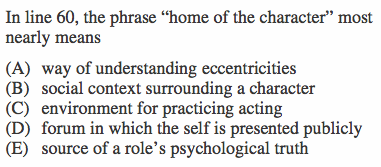
In these cases, you're being asked to define a phrase with another phrase. Either way, however, both word in context and phrase in context questions should be approached in the same way: always, always go back to the line in which the word or phrase appears—don't let the SAT fool you into answering without checking!
Ready to go beyond just reading about the SAT? Then you'll love the free five-day trial for our SAT Complete Prep program. Designed and written by PrepScholar SAT experts, our SAT program customizes to your skill level in over 40 subskills so that you can focus your studying on what will get you the biggest score gains.
Click on the button below to try it out!
Question Type 2: What Word Is Defined By The Passage?
These questions ask you to recognize the definition in the passage and relate it to the answer choice that matches it. In contrast to the previous question type of vocab-in-context questions, I think of these as asking "Here's the definition, what's the word?"
The SAT has more varied ways of asking these questions than the "here's the word, what's the meaning?" questions. I've written up below a short list of examples that I've come across in my reviewing of SAT practice tests. Disclaimer: I have edited the questions so that they all refer to the same subject matter; these are not questions that appeared on the actual SAT (yet???).
- The public's response described in line 42 most strongly suggest that Dracula's acts were…
- Based on the description in the last sentence, Dracula could best be characterized as…
- In line 42, Dracula is portrayed as…
- The author uses the word "monster" (line 42) to convey the narrator's sense of…
- The author characterizes a "vampire" (line 42) as something…
- In line 42, the author describes vampires as…
- The information in the second paragraph indicates that the vampire's "modern reputation" is…
- The second paragraph indicates that Dracula believes the "proper state" would be one of…"
"What word is defined by the passage?" questions can actually be easier than the "here's the word, what's the definition?" questions. Why? Because since the definitions are in paragraph form, you may be able to gather more information to help answer the question. Here's another actual SAT example (this time unmodified):
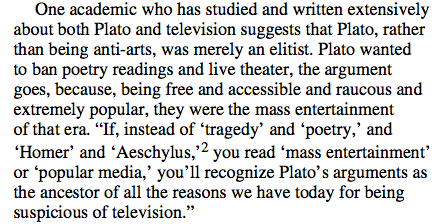
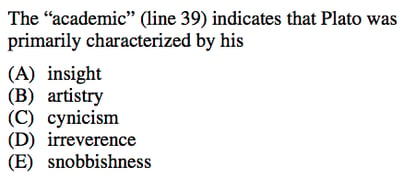
If you know the definition of the word "elitist," that can be an easy shortcut to the answer: Plato was an elitist, which probably means he was characterized by (E) snobbishness.
If you don't know what elitist means, however, the author goes on to explain further in the rest of the paragraph: Plato wanted to ban things for being free, accessible, and popular…that sounds snobby. Okay, (E) snobbishness it is.
 Plato by Tilemahos Efthimiadis, used under CC BY-SA 2.0/Cropped from original.
Plato by Tilemahos Efthimiadis, used under CC BY-SA 2.0/Cropped from original.
Plato…the first hipster?
Strategies To Master Vocabulary In Context Questions
So what strategies can you use to master these two types of SAT Reading questions? I've put together a three-step strategy guide below.
Strategy 1: Rephrase the information given.
For questions that ask about words in context, define the word first in your head (or on scrap paper, whichever is easier) in the context of the sentence or paragraph, without looking at the answer choices. Remember, your rephrasing does not have to be elegant as long as it conveys the meaning. For instance, take a look at example C:
"This article effectively concedes that Stoker's magnificent story cannot be recovered from the misuse and distortion it has suffered since his death."
In this line, "suffered" most nearly means…

My thought process: Let me replace the word with one that keeps the meaning of the sentence. "This article effectively concedes that Stoker's magnificent story cannot be recovered from the misuse and distortion it has had to deal with (in a negative and painful sense) since his death." Yeah, that works (aside: well, I can see why the author used just one word).
For questions that ask you to take a paragraph and choose the best answer that describes it, answer the question in your own words before looking at the answer choices. See example D:

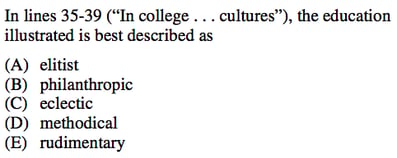
My thought process: Question is asking about the education described in these lines. Okay, what does the paragraph say? In college there's assigned reading, but the important thing is when students discover books on their own and jump back and forth across history, languages, and cultures. That sounds like a diverse education to me. Okay, I've got that, now I can look at the answer choices.
Strategy 2: Cross out answers that clearly don't fit.
Sometimes, you can get to the right answer just by knowing what the wrong answers are. This is an especially useful strategy if there's an answer choice with a word that you don't know the meaning of. If you know that the other three answers are definitely wrong, it doesn't matter that you don't know what the meaning of the fourth answer is; by process of elimination, it must the correct choice. Let's take a look at this strategy in the context of example C, from before:

My thought process: Okay, the choices are endured, felt, prolonged, tolerated, and lamented. Which of these are close to "had to deal with (in a negative and painful sense)?" Endured: yes. Felt: no. Prolonged: not really. Tolerated: not really negative. Lamented: no. The answer is probably (A) endured.
This strategy still works if you are trying to sum up the meaning of a paragraph in one word. I'll copy and paste example D again, so you don't have to scroll back up:


My thought process: The choices are elitist, philanthropic, eclectic, methodical, or rudimentary. Which of these are close to meaning diverse? Elitist: I don't think so. Philanthropic: doesn't that have something to do with giving money to people? Maybe? Eclectic: someone with eclectic interests has a lot of different interests. Hmm. Seems more likely! Methodical: no. Rudimentary: looks like rude, but who knows [note: I know]. The right answer is probably (C) eclectic
[Second note: Even with process of elimination, this question would be pretty tricky if you didn't know the meaning of eclectic, philanthropic, or rudimentary. For more on how to study and learn vocab effectively, click here].
Strategy 3: (Optional) Plug the definition back in.
This strategy works best for the "here's the word, what's the meaning?" questions, because word-for-word substitutions are a lot simpler than word-to-sum-up-entire-paragraphs-of-information substitutions. Let's take one more look at example C, a "here's the word, what's the meaning?" question:
"This article effectively concedes that Stoker's magnificent story cannot be recovered from the misuse and distortion it has suffered since his death."
In this line, "suffered" most nearly means…

My thought process: Substitution time! "This article effectively concedes that Stoker's magnificent story cannot be recovered from the misuse and distortion it has endured since his death." Yep, that's right. Just to double check with the maybes:
"This article effectively concedes that Stoker's magnificent story cannot be recovered from the misuse and distortion it has prolonged since his death." haha what that doesn't make any sense
"This article effectively concedes that Stoker's magnificent story cannot be recovered from the misuse and distortion it has tolerated since his death." I mean, sort of? But why bother with "sort of" when I have a definite yes? (answer: do not bother with "sort of" if you have a definite yes)
 Get Plugged In by Rennett Stowe, used under CC BY 2.0.
Get Plugged In by Rennett Stowe, used under CC BY 2.0.
Whew. Where Do I Go From Here?
Are these strategies fine in theory, but hard to put into practice because you always run out of time before finishing? Discover how to avoid that terrible time crush with our article on time management on SAT Reading.
Want more in depth guides like this? Use our ultimate guide to SAT reading for links to more articles on the other types of SAT Reading questions.
What are the other types of questions you'll find on the SAT, and what's the best way to read the passage to answer them? We have strategies for reading passages effectively here.
What are the skills you'll need to excel on the SAT Critical Reading? Read our overview of what's actually tested on SAT Reading for the answer.
Want to improve your SAT score by 160 points?
Check out our best-in-class online SAT prep program. We guarantee your money back if you don't improve your SAT score by 160 points or more.
Our program is entirely online, and it customizes what you study to your strengths and weaknesses. If you liked this Reading lesson, you'll love our program. Along with more detailed lessons, you'll get thousands of practice problems organized by individual skills so you learn most effectively. We'll also give you a step-by-step program to follow so you'll never be confused about what to study next.
Check out our 5-day free trial:
Have friends who also need help with test prep? Share this article!

Laura graduated magna cum laude from Wellesley College with a BA in Music and Psychology, and earned a Master's degree in Composition from the Longy School of Music of Bard College. She scored 99 percentile scores on the SAT and GRE and loves advising students on how to excel in high school.



































 Holly R.
Holly R.